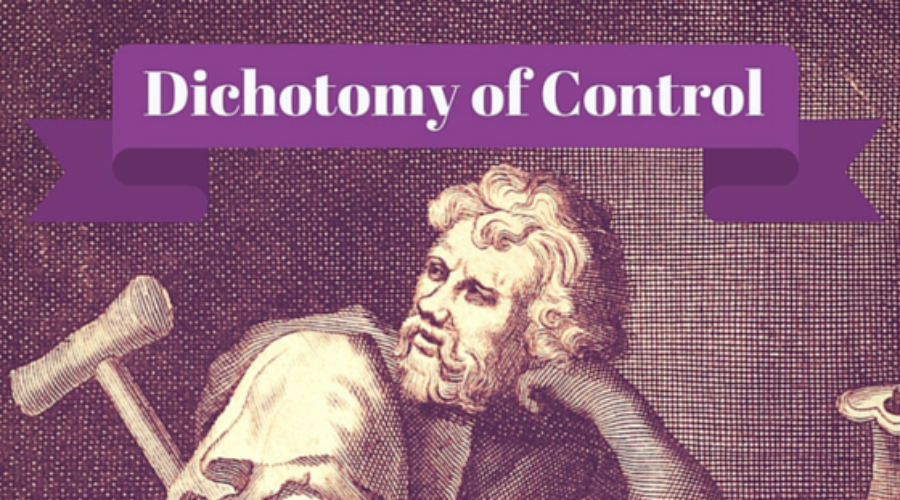UPDATE: This topic is also covered in Episode 6 of the Stoicism On Fire podcast
Some things are within our power, while others are not. Within our power are opinion, motivation, desire, aversion, and, in a word, whatever is of our own doing; not within our power are our body, our property, reputation, office, and, in a word, whatever is not of our own doing. (Enchiridion 1)
The Stoic Dichotomy of Control (DOC) is simultaneously the most intuitively simple aspect of Stoicism to understand and the most profoundly difficult to practice consistently. Epictetus explains the DOC in Enchiridion 1. The intuitively simple part of the DOC is the assertion that some things are ‘up to us’ (within your power), and others are ‘not up to us’ (not within your power). Only a truly insane person would argue that everything is within their power; such a belief would be a sign of an extremely distorted sense of reality. Unfortunately, sanity is a matter of degree and most of us regularly behave as if we are insane by thinking and acting as if things outside of our control are ‘up to us.’ The result should not come as a surprise; Epictetus provides us with the symptoms of this disease:
If you regard that…which is not your own as being your own, you’ll have cause to lament, you’ll have a troubled mind, and you’ll find fault with both gods and human beings… (Enchiridion 1)
That is not a pleasant diagnosis. However, every one of us experiences the profound truth of that statement regularly. Why? Because we continue to live in a state of partial insanity—we desire things that are ‘not up to us’ and we fear events outside of our control. That brings up to the profoundly difficult part of the Stoic DOC, accepting how little lies within our power. Epictetus delimits our sphere of control quite succinctly:
Of existing things, God has placed some within our power, and others not within our power. Within our power he has placed the most important thing, that through which he himself is happy, the power to deal with impressions. (Fragment 4)
The ‘power to deal with impressions’ is all we control. We control our opinions, impulses, desires, and aversions, nothing more. Therein lies the rub; we moderns simply refuse to accept that we are not in control. We tend to internalize those famous lines from Invictus, “I am the master of my fate, I am the caption of my soul”[1] and misinterpret them to mean we can overcome any obstacle in our path. Epictetus suggests otherwise. Fate and fortune constrain us far more than we like to admit. Some modern Stoic writers have expanded the Dichotomy of Control to a Trichotomy of Contol to give us moderns ‘partial control’[2] over some external events. I think this opens the door to the very problem the Stoics sought to avoid: assuming too much power over outcomes. Kevin Patrick Jr may be correct; the motive behind this expansion to a trichotomy is most likely to provide an escape from the teleological and theological implications of traditional Stoicism.[3] I will not belabor the debate between the dichotomy and trichotomy here. My point is that we almost always assume we have more control over events than we truly do. According to Epictetus, that is a mistake and the source of tremendous psychological angst.
We seek the virtue and well-being promised by the Stoics; however, we frequently ignore the doctor’s advice. Through his Discourses, Epictetus give us moderns the same diagnosis he gave of the wealthy and powerful Roman, Naso:
‘Your desires are inflamed, your aversions are low, your purposes are inconsistent, your motives are out of harmony with nature, your opinions are ill-considered and mistaken’ (Discourse 2.14.22)
The diagnosis is bad and the medicine necessary to heal us is strong, so we ignore our angst and justify our bad opinions, desires, and aversions. We remain insane by choice because the path of the Stoic prokopton appears too hard. We dabble with or maybe even attempt the traditional Stoic path, which traverses challenging, and occasionally steep and precarious terrain. Then, we glimpse the lush valley below and mistakenly assume it offers a safer and shorter path to virtue and happiness. This is the disease of modernity; we want instant gratification, and we want it without much effort. If Stoicism cannot be broken down into three to five easy steps or turned into a life hack, we are not interested. Meanwhile, our troubled minds lament and we find fault everyone else rather than take responsibility for our psychological angst.
Nothing will have a more profound impact on your practice of Stoicism than consistent application of the Dichotomy of Control. Read, and even memorize, Enchiridion 1 and use the chart below to remind yourself where each path leads. The ‘In your power’ path leads to freedom and equanimity in all circumstances; while the ‘Not in your power’ path leads to a troubled mind, lamenting, and fault finding. The dichotomy of control is simple to understand, yet most profoundly difficult to practice consistently. Nevertheless, it provides the key to progress for the Stoic prokopton.
ENDNOTES:
[1] Henley, W. Invictus
[2] Irvine, W. (2009). A guide to the good life: The ancient art of Stoic joy. Oxford: Oxford University Press.
[3] Patrick, K., Jr. (2015, October 21). On the Stoic Dichotomy… or is it Trichotomy? Retrieved April 18, 2016, from https://mountainstoic.wordpress.com/2015/10/21/on-the-stoic-dichotomoy-or-is-it-trichotomy/




